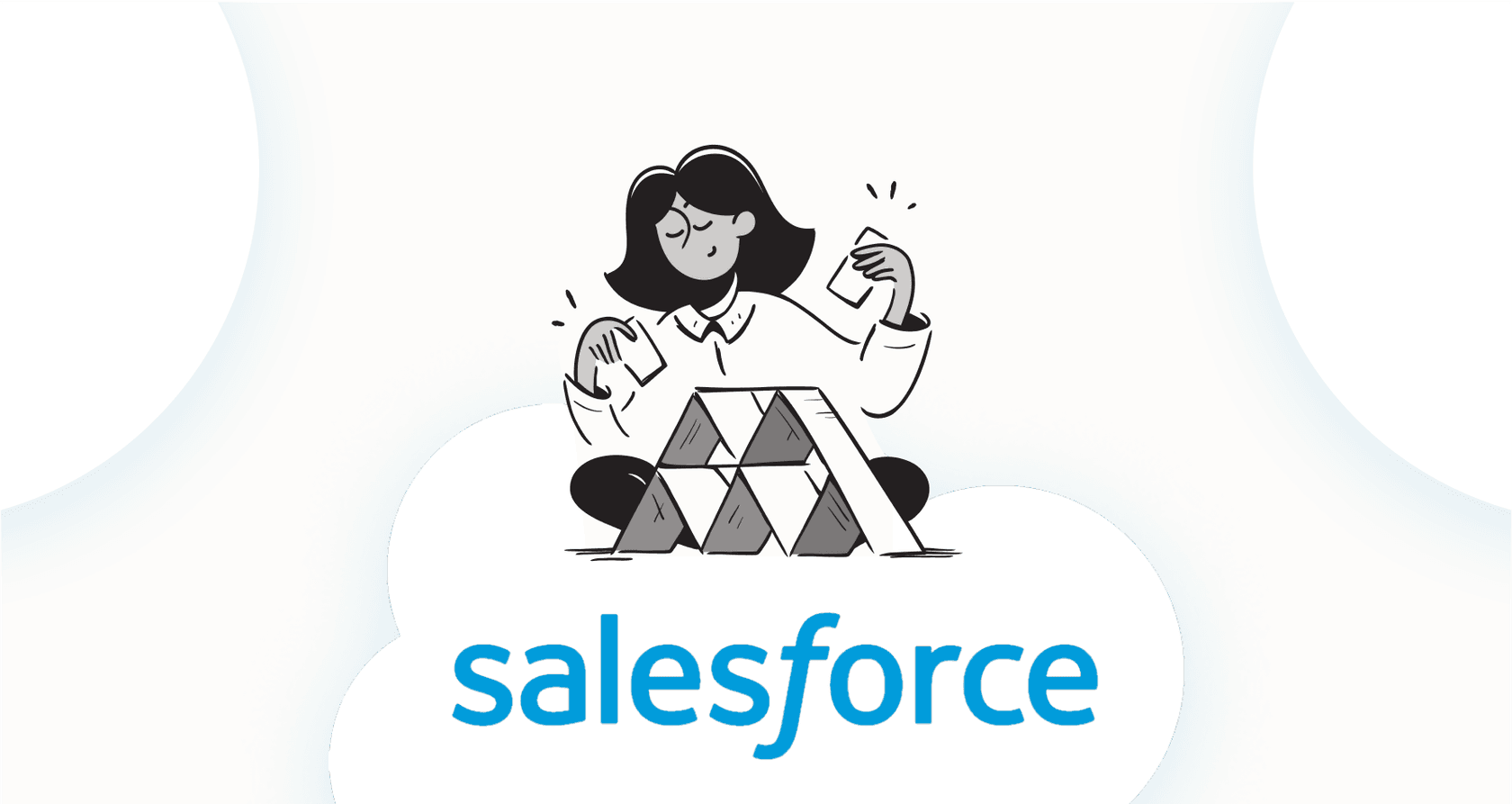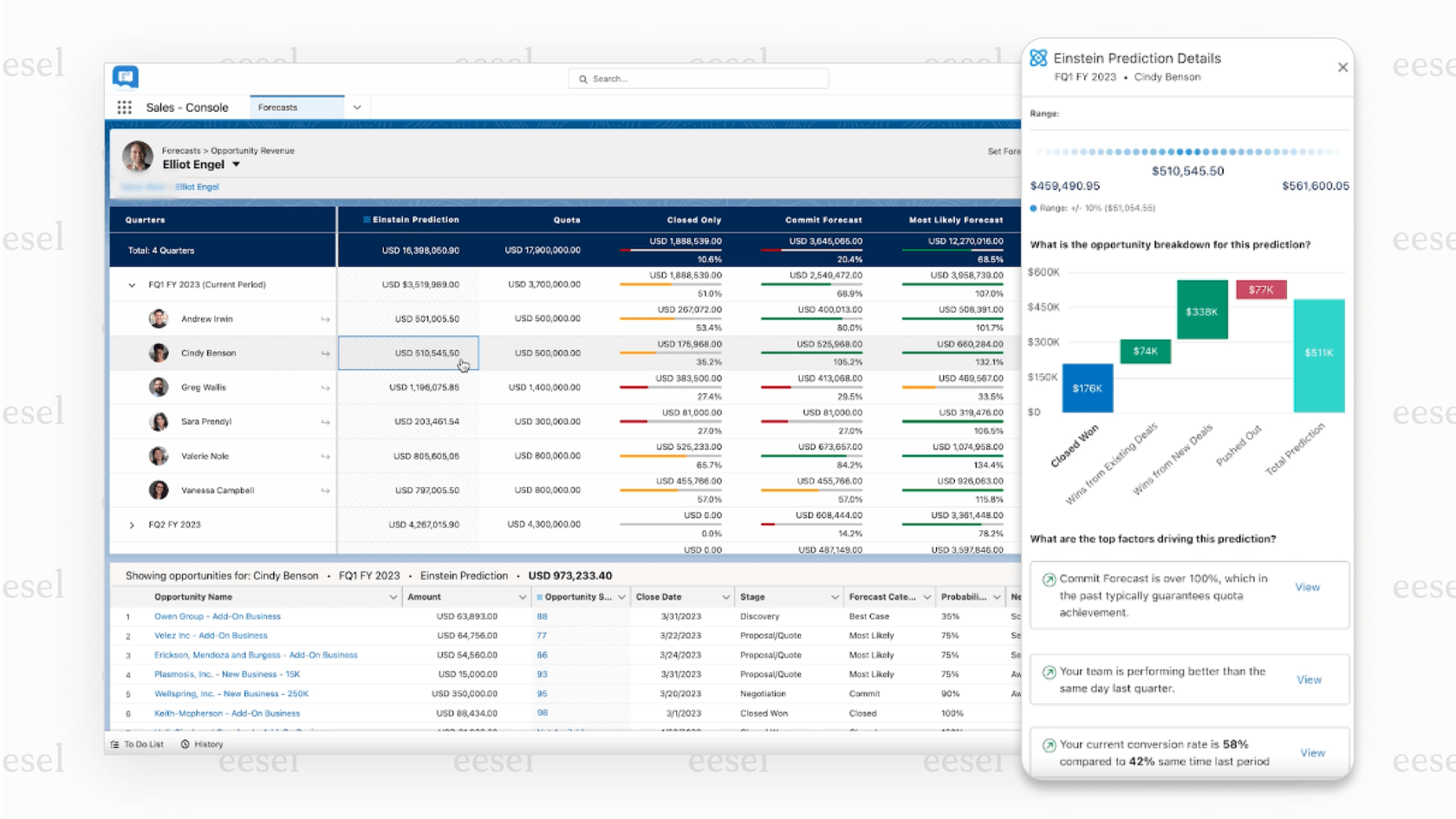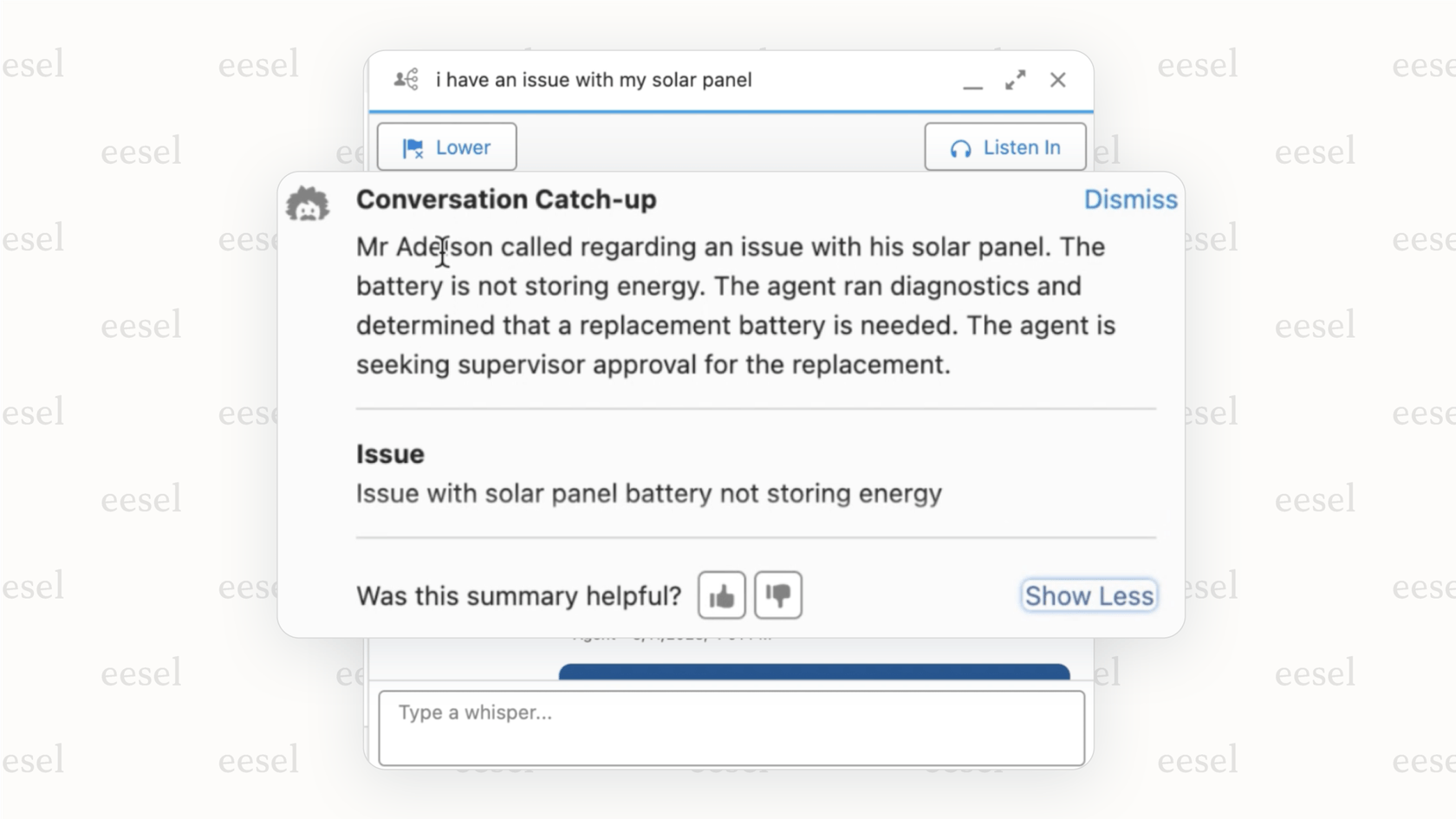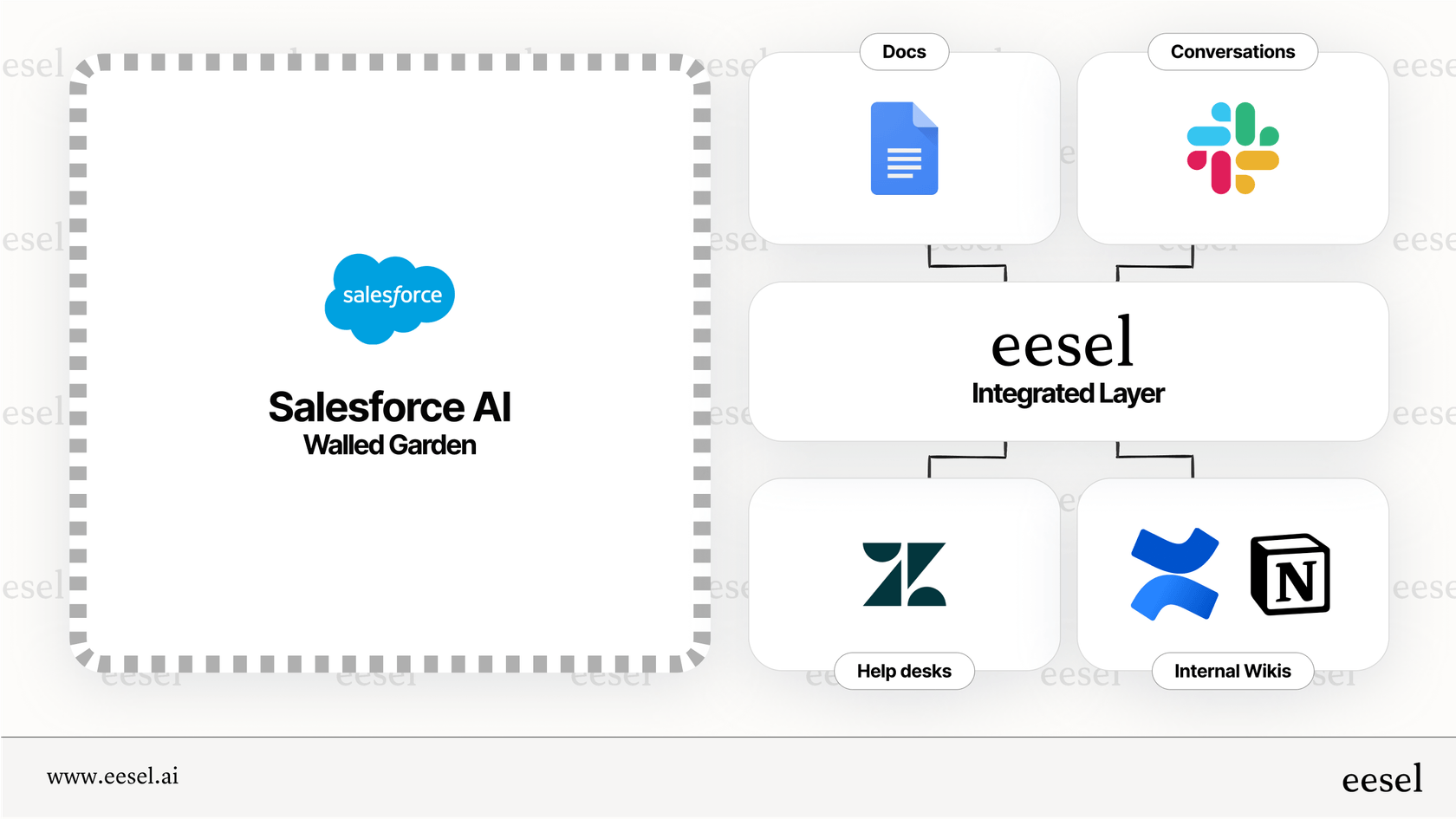
If you’ve spent any time on business forums lately, you've probably seen the question pop up: Can AI replace Salesforce already and save us from those hefty license fees? A quick dive into Reddit shows a pretty lively debate, but the general feeling is clear: it’s not quite that simple.
So, could a really smart AI agent truly take the place of a massive system of record like Salesforce?
Honestly, no. At least not right now. AI and CRMs do fundamentally different jobs. Think of AI not as a replacement for Salesforce, but as a powerful intelligence layer that works with it. The real conversation we should be having isn't about replacement, it's about enhancement. How can you cleverly integrate AI to squeeze more value out of the systems you’re already paying for?
Let's break down the distinct roles of AI and CRMs, see how AI is already helping out in Salesforce, talk about its limits, and explore a smarter way to add AI to your setup without getting stuck in one ecosystem.
What is Salesforce and why can’t its core job be replaced?
One of the biggest points of confusion we hear is the difference between a system of record (your CRM) and a system of intelligence (an AI agent). Let's clear that up.
Salesforce as the system of record
A CRM like Salesforce is, at its heart, a very organized database. It's the official source of truth for all your customer information: contacts, accounts, deals, and every conversation you've had. This "system of record" is the backbone that gives your business data shape and meaning. Without this solid foundation, an AI would have no reliable information to learn from or do anything with.

Of course, Salesforce has its frustrations. It's incredibly powerful, but it can also be expensive and a beast to manage, which is exactly why so many people are looking to AI to make it more valuable.
The role of agentic AI
Agentic AI is a layer that sits on top of systems like Salesforce. Its job is to read data, figure out the context, and get tasks done.
Here’s an analogy: if Salesforce is the entire logistics network, warehouses, trucks, and planes, then an AI agent is the smart, automated storefront that talks to customers and puts orders into the system. That storefront is pretty useless without the whole delivery infrastructure behind it.
An AI agent needs the CRM's organized data to do its job well. It can't just invent business insights, track sales opportunities, or report on company performance out of thin air. It needs a reliable source of truth to work with, and for most businesses, that's Salesforce.
How AI is augmenting, not replacing, Salesforce
While a full replacement is off the table, AI is already making a real difference by automating tasks and digging up insights within platforms like Salesforce. But the built-in approach comes with its own set of headaches that are worth understanding.
Automating workflows
Salesforce has its own native AI, sometimes called "Einstein" or other branded names, which helps with things like lead scoring, forecasting, drafting emails, and answering basic customer questions. These tools can definitely give your team a productivity boost by handling the repetitive stuff.

But there’s a catch. These features are often bundled into the most expensive Salesforce plans, making them a non-starter for many businesses. More importantly, they pull you deeper into a single vendor's world. This makes it tough to connect other tools or access knowledge from outside sources, which is a huge problem for any company that doesn't live 100% inside Salesforce.
Generating insights
Another thing AI is great at is analyzing the mountain of data stored in Salesforce. It can spot trends, predict which deals are likely to close, and even give sales reps real-time tips during calls. This is where AI shines, turning your raw CRM data into smart, actionable advice by finding patterns humans might miss.
The challenge of siloed knowledge
Here’s the biggest flaw with most built-in AI: it only knows what's inside its own little box. In the real world, your company's knowledge isn't just in Salesforce. It's scattered across Google Docs, wikis in Confluence, threads in Slack, and thousands of past help desk tickets.

An AI that can only see Salesforce data can't answer a tricky support question that needs info from a technical document or a project plan. It's basically working with one hand tied behind its back. This is where a more flexible approach is needed. A truly smart system has to connect all your knowledge, not just a piece of it. That’s why tools like eesel AI are built to plug into all your different knowledge sources, creating a single, complete brain for your entire company.
Where AI falls short and why you still need people
AI is an amazing tool, but it lacks the nuanced understanding, creativity, and emotional intelligence that make humans so valuable in sales and support. Thinking AI can do it all is a fast track to disappointment.
Complex problem-solving
AI is a champ at following patterns and doing tasks based on rules. It can look at past data and guess a likely outcome. But it gets stuck when it faces a brand-new situation that requires some creative thinking. Things like negotiating a tricky enterprise deal, designing a custom solution for a client, or mapping out a long-term account strategy all depend on human judgment and experience.
Building relationships
At the end of the day, sales and customer support are about human connection. An AI can't build real rapport with a prospect, show genuine empathy for a frustrated customer, or earn the deep trust needed to close a big deal. These are uniquely human skills, and they aren't going anywhere. AI can handle the transactional bits of the job, which frees up your team to focus on building relationships.
The need for validation
You could prompt an AI to create a new field in Salesforce or build a simple workflow, but it doesn’t get the bigger picture. It has no idea if that new field will mess up an existing integration or break a critical report.
Human developers and admins are still absolutely essential for designing systems that can scale, keeping data clean, and making sure the AI's actions actually line up with what the business needs. AI can automate the "what," but people still need to define the "why" and the "how."
A better approach: Integrating a flexible AI layer
Instead of ripping out your CRM or getting locked into an expensive, closed AI system, the smarter strategy is to add a flexible AI layer that plays nicely with all your existing tools. This gives you all the power of AI without being tied to a single vendor.
Unify knowledge
The best part of an integration-first approach is that it solves the siloed knowledge problem. A tool that connects to Salesforce, but also to help desks like Zendesk, wikis like Confluence, and shared drives like Google Docs, creates one unified source of knowledge. An AI agent that can learn from everything your company knows can give much more accurate and complete answers than one stuck with only CRM data. Unlike native tools, an independent AI layer like eesel AI learns from your past support tickets, internal wikis, and product docs to give your team complete answers, right inside your helpdesk.
Go live in minutes
We’ve all been through those painfully slow and expensive enterprise software rollouts. Getting AI turned on in a platform like Salesforce can often mean long sales cycles and pricey consultants. A modern, self-serve approach lets you get value almost immediately. For example, you can connect eesel AI to your tools and be up and running in minutes, all on your own. No mandatory demos or sales calls needed. This puts you in control, letting you build, test, and deploy on your own schedule.
Test with confidence
Letting an AI talk directly to customers can be nerve-wracking. What if it says the wrong thing? A great AI platform should let you test it out safely first, so you can roll it out feeling confident. The best platforms help you de-risk the whole process. For instance, eesel AI offers a powerful simulation mode that shows you exactly how it would have handled thousands of your past tickets. This gives you real performance data and a clear ROI forecast before it ever interacts with a live customer.
Understanding Salesforce AI pricing
Adding AI to Salesforce isn't cheap, and the pricing structure shows it. According to Salesforce's official pricing page, their AI features are mostly available as an add-on for their top-tier plans.
Here's a quick look:
| Plan | Price (per user/month, billed annually) | AI Availability |
|---|---|---|
| Enterprise | $175 | Available for purchase as an add-on |
| Unlimited | $350 | Available for purchase as an add-on |
| Einstein 1 Sales | $500 | Full suite of AI included |
This per-user pricing model can get very expensive, very fast, especially if your team is growing. It's a big contrast to platforms like eesel AI, which offers transparent, usage-based pricing. This gives you more predictable costs that don't punish you for adding more people to your team.
The final answer: Can AI replace Salesforce?
So, can AI replace Salesforce? Nope. A CRM is the foundational system of record, and AI is the intelligence layer that makes that record useful. The future isn't about ripping and replacing; it's about smart augmentation.
The companies that succeed won't be the ones that chase every new trend. They'll be the ones that enhance their core systems with flexible, connected AI that works across their entire tech stack. By automating the repetitive work, AI frees up your team to focus on what people do best: building relationships, solving tough problems, and driving real growth.
Bring true AI to your Salesforce workflows
Ready to see how an integrated AI layer can improve your existing setup? eesel AI connects to Salesforce and all your other knowledge sources to power autonomous support, draft agent replies, and more. You can get started in minutes.
Frequently asked questions
AI can automate tasks and provide insights within Salesforce, but it cannot replace Salesforce's core function as a system of record. It acts as an intelligence layer that enhances your CRM's capabilities.
Salesforce serves as the official source of truth for all customer information, providing the structured data an AI needs to operate. Without this reliable foundation, an AI would lack the necessary information to learn from or perform tasks effectively.
AI is currently used in Salesforce for tasks like lead scoring, sales forecasting, drafting emails, and handling basic customer inquiries. It boosts productivity by automating repetitive tasks and generating insights, but it doesn't replace the CRM itself.
AI struggles with complex, creative problem-solving, building genuine human relationships, and understanding nuanced contexts. These areas still heavily rely on human judgment, empathy, and experience.
A more effective approach involves integrating a flexible AI layer that connects to Salesforce and other knowledge sources like Google Docs, wikis, and help desks. This creates a unified knowledge base for more comprehensive AI insights.
Salesforce's native AI features are often bundled into higher-tier plans or sold as expensive add-ons, significantly increasing costs. Independent AI solutions typically offer more transparent, usage-based pricing models.
Humans are crucial for complex problem-solving, building client relationships, validating AI actions, and defining strategic "why" and "how." AI handles transactional tasks, freeing humans to focus on high-value activities that require unique human skills.
Share this post

Article by
Kenneth Pangan
Writer and marketer for over ten years, Kenneth Pangan splits his time between history, politics, and art with plenty of interruptions from his dogs demanding attention.







